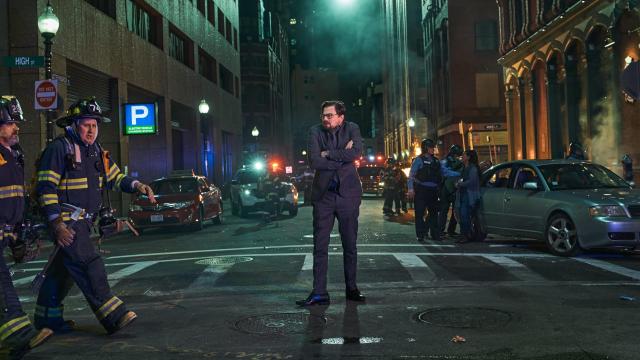Don’t Look Up made history recently, breaking Netflix’s record for the number of viewing hours in one week. People spent more than 152 million hours collectively watching the movie last week, indicating an incredible amount of interest.
Regardless of what you think of the movie, this many people watching a movie with climate themes has undeniable merit. But what its creators and climate-focused star, Leonardo DiCaprio, are looking to do — convince people to act on climate after seeing it — has serious problems.
The role of Randall Mindy, the scientist who is desperately trying to alert the world about an extinction-level comet headed for Earth, seems to be a natural fit for DiCaprio at this point in his career. His reach is enormous, and his star power undeniable; there’s no question he helped drive up viewership. He’s also one of Hollywood’s most vocal climate advocates. He started an environment-focused foundation in 1998; interviewed Barack Obama about the Paris Agreement; centered his 2016 Oscar acceptance speech around climate; was named a United Nations Messenger of Peace in 2014; and sits on the board of several environmental charities.
Don’t Look Up has been promoted as a call to action by both its creators and DiCaprio, who has been busy promoting similar themes in interviews and sharing the movie’s website and calls to action on Twitter. Yet those calls are where things go a little off the rails, reflecting a failure of imagination.
One of the big problems I had with Don’t Look Up is that a comet is actually a pretty bad analogy for climate change. It’s an outside factor easily stoppable by brute force and the movie suggests simply looking up is all humanity needs to do.
Similarly, Don’t Look Up’s official action website, which DiCaprio and the film’s creators have been heavily promoting, offers a host of individual actions (eating vegetables, talking to friends and colleagues, walking to work). These personal actions are all good and fine, but the idea that individuals can fix a systemic problem by altering their personal choices is an idea that was originally created and promoted by fossil fuel companies. It will never be enough.
The idea that raising awareness is the key to climate action has also dominated discourse for decades. There are no shortage of campaigns to do just that, and many of them are run by the same wealthy nonprofits DiCaprio sits on the boards of. Yet we continue to hurtle toward disaster precisely because we need much more than awareness and individual-level fixes in everyday people’s lives.
Whenever DiCaprio is in the news for his climate charity work, a right-wing outlet always smugly runs a piece about his private jet use. While these critiques are in bad faith, they do point out their own inconvenient truth that DiCaprio is part of the sliver of rich people who could actually make a real carbon dent if they changed up their lifestyles or gave away more of their money. Just four hours of flying on a private jet emits as much carbon dioxide as the average person living in the EU does each year. If lifestyle changes are where Don’t Look Up wants to focus people’s energies, then its charismatic star could certainly do a lot more than a random viewer in Tuscaloosa, Alabama.
The actions DiCaprio is promoting as part of Don’t Look Up fail to properly confront power. Celebrity activism is inherently a strange, slippery slope. But compare what the Don’t Look Up push to, say, the work of Jane Fonda in recent years. She’s stood on the frontlines, sparking an uprising with Fire Drill Fridays. and showing up to support Indigenous protesters fighting the Line 3 pipeline in Minnesota. Her work confronts the powers driving the climate crisis directly and aligns with Indigenous and other groups who stand to lose the most from the climate crisis. That has the potential for getting people involved in creating lasting, transformational change in line with what’s needed rather than telling folks to put down that hamburger. DiCaprio’s activism is where climate action has been stuck for a few decades, as an elite class attempts to “raise awareness” about climate; Fonda’s direct action feels like the future of confronting power and holding them accountable. Netflix, for its part, reached out to climate communicators on how to improve its site to reflect the scope of what’s needed.
https://twitter.com/a/status/1476939364441772032
There are limits to engaging with a capitalist machine like Hollywood to send a political message on something as complex as climate. While DiCaprio and Don’t Look Up’s creators clearly want the movie to function both as a hugely successful piece of entertainment and a call to action, it’s not that easy.
It’s also, frankly, a little hard to be told by someone who partied with Jeff Bezos on a $US150 (A$210) million yacht for New Year’s that we’re not paying enough attention to climate change. It’s a strange feeling to have that same guy, who earned $US30 ($42) million for this climate-themed movie, tweet about a website that tells me to switch to LED lights to fix the problem. People should tell climate stories in art because they’re interesting, compelling stories, as Don’t Look Up’s success proves. Art is a powerful lens to look at the society we have and how to fix what is broken. But fashioning this movie as an action campaign needs a lot more nuance than this.
